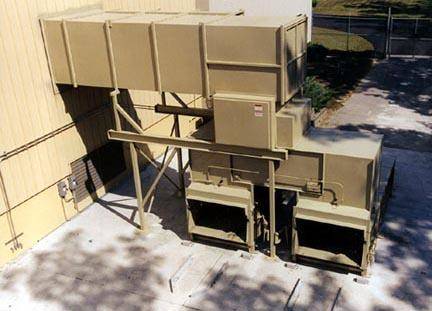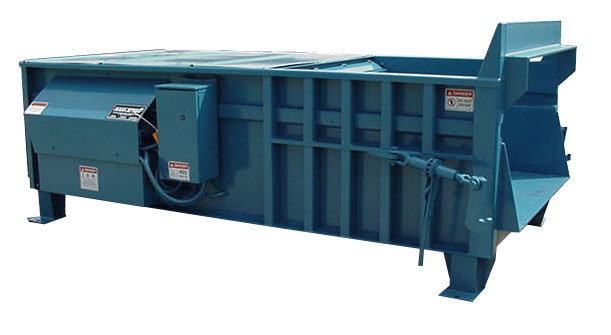A closer look at Commercial trash compaction equipment for optimized waste solutions
Wiki Article
The Role of Waste Equipment in Promoting Sustainable Garbage Disposal Practices
Waste Equipment serves a basic function in progressing sustainable garbage disposal practices. It incorporates an array of tools made to enhance the performance of waste processing, segregation, and collection. By making use of Equipment such as compactors, shredders, and reusing bins, areas can considerably decrease their dependence on land fills. However, the effect of these tools expands past capability. Understanding their wider implications exposes insights right into just how they shape ecological duty and area interaction. What lies ahead in this progressing landscape?Comprehending Waste Equipment and Its Relevance
Waste Equipment plays a vital duty in efficient waste management systems. It encompasses a variety of tools and equipment developed to take care of, procedure, and take care of waste products successfully. Recognizing waste Equipment is very important for districts, organizations, and companies aiming to execute lasting garbage disposal methods - Commercial garbage compaction equipment. Effectively functioning waste Equipment not just simplifies the collection and transportation of waste but additionally decreases ecological effect by making sure that waste is handled sensiblyThe importance of waste Equipment includes boosting reusing efforts, decreasing garbage dump use, and advertising source healing. Equipment such as compactors, balers, and shredders assist in the processing of waste, making it less complicated to divide recyclable materials from general refuse. Additionally, improvements in waste innovation contribute to the growth of more eco-friendly services, therefore enhancing the commitment to sustainability. On the whole, waste Equipment offers as a foundation for effective waste administration, promoting a cleaner and healthier atmosphere for future generations.
Sorts Of Waste Equipment for Effective Waste Administration
Efficient waste management relies upon numerous types of Equipment made to address details disposal demands. Amongst these, compactors play a crucial duty by minimizing the quantity of waste, making transport much more efficient. Shredders are important for damaging down big products, facilitating much easier handling and disposal. Additionally, balers compress recyclable products right into manageable bales, optimizing storage and transport.Containers and containers are essential for gathering waste at the source, assuring correct partition and minimizing contamination. For unsafe products, specific Equipment, such as drum crushers and watertight containers, is essential to ensure security and compliance with regulations.
Transportation lorries outfitted with hydraulic systems boost the performance of waste collection and disposal procedures. Each sort of waste Equipment adds to a streamlined waste management system, promoting sustainability and lowering environmental impact via efficient disposal practices.
The Role of Recycling Containers in Lasting Practices
Recycling bins play a necessary duty in advertising sustainable methods by helping with efficient waste splitting up. By offering assigned containers for recyclable materials, they urge individuals to take on eco-friendly behaviors. This easy execution substantially adds to decreasing landfill waste and improving recycling rates.Effective Waste Separation
Appropriate waste separation plays a crucial function in promoting lasting practices, and reusing bins function as a considerable tool in this process. By clearly comparing recyclables, compostables, and basic waste, these bins help with reliable sorting, minimizing contamination and making the most of reusing effectiveness. Their tactical positioning in public and personal rooms motivates people to take part in responsible garbage disposal. The use of color-coded bins helps to simplify the separation process, making it intuitive for individuals. This organizational technique not just enhances reusing prices yet also elevates recognition concerning the significance of waste management. Basically, recycling containers are essential elements that support effective waste separation, eventually adding to a much more sustainable setting and minimizing the total stress on garbage dumps.Motivating Eco-Friendly Actions
People might be inclined to forget their effect on the atmosphere, the existence of recycling bins considerably influences environmentally friendly habits. These bins work as aesthetic tips, motivating people to separate recyclables from general waste. Their tactical placement in public areas promotes access, making it much easier for individuals to embrace sustainable techniques. Studies indicate that when recycling bins are readily available, reusing rates increase significantly, mirroring a straight correlation in between framework and behavior. In enhancement, vibrant signage on these bins educates customers regarding what products can be reused, reducing contamination prices. By promoting a culture of recycling, these bins not only assist in appropriate waste management yet likewise inspire a collective obligation toward ecological stewardship, ultimately adding to a much more sustainable future.Composting Systems: Turning Waste Into Resources
Composting systems serve as a crucial tool in transforming organic waste right into useful resources, supplying numerous environmental advantages. Various types of composting Equipment satisfy different needs, making the process available to both neighborhoods and people. Understanding the composting procedure is crucial for optimizing its effectiveness and promoting lasting waste monitoring methods.Advantages of Composting Equipments
Several areas are significantly acknowledging the various benefits of composting systems, read this article which change organic waste into valuable resources. These systems effectively lower landfill waste, therefore lowering greenhouse gas emissions and conserving natural deposits. By transforming food scraps, lawn waste, and other natural products right into nutrient-rich compost, they boost dirt health and fertility, advertising sustainable agriculture practices. Composting helps to retain moisture in the soil, lowering the need for chemical fertilizers and watering. It fosters biodiversity by giving an environment for useful bacteria and insects. Additionally, composting informs people concerning environmental stewardship, motivating a society of sustainability. Overall, composting systems play a vital duty in creating a circular economic climate, where waste is minimized, and resources are reused.Types of Composting Equipment
A selection of composting Equipment is offered to facilitate the reliable handling of organic waste right into beneficial compost. These systems range from straightforward backyard garden compost bins to advanced commercial composters. For home use, tumblers and static containers are prominent, enabling for convenient aeration and mixing. Oxygenated static piles utilize blowers to improve air movement, greatly accelerating decomposition. Large procedures may use in-vessel composters, which control temperature and moisture for perfect composting problems. Worm composters, or vermicomposting systems, harness the natural digestive system processes of worms to break down raw material. Furthermore, shredders and chippers aid prepare materials by decreasing dimension, promoting faster failure. Each sort of Equipment serves particular demands, enabling varied composting practices that contribute to lasting waste management.Composting Process Explained
The composting process transforms organic waste into nutrient-rich sources through a collection of organic and chemical reactions. Microbes such as fungi and microorganisms break down natural materials, consisting of food scraps and yard waste. This decay creates heat, helping with further microbial activity and speeding up the break down procedure. As the compost matures, the temperature reduces, permitting beneficial microorganisms to flourish. The existence of oxygen is essential, promoting cardiovascular conditions that boost microbial performance. Throughout this procedure, carbon-to-nitrogen proportions need to be maintained to maximize decay. The end outcome is humus, a dark, crumbly material abundant in nutrients, which can be made use of to enhance dirt, support plant growth, and contribute to lasting agricultural techniques.Ingenious Technologies in Waste Collection and Disposal
As cities face enhancing waste quantities and environmental worries, innovative innovations in waste collection and disposal emerge as essential solutions. Smart waste containers geared up click over here now with sensors track fill degrees, maximizing collection routes and lowering gas intake. These containers can likewise connect with waste management systems, decreasing and assisting in prompt pickups overflow issues. In addition, independent vehicles, consisting of drones and robot systems, are being released to enhance operational efficiency in waste collection.Developments in arranging modern technologies, such as artificial intelligence and artificial intelligence, make it possible for extra reliable reusing procedures by rapidly recognizing and dividing products. In addition, waste-to-energy technologies convert organic waste into renewable resource, decreasing land fill dependence and contributing to energy sustainability. These advancements not only improve waste administration practices but also advertise a circular economic situation, thus promoting a lasting technique to waste disposal. Eventually, the assimilation of these innovations plays a pivotal role in dealing with urban waste difficulties and improving environmental stewardship.
Area Interaction With Waste Equipment
While effective waste monitoring counts greatly on innovative modern technologies, neighborhood involvement with waste Equipment plays a necessary function in cultivating sustainable methods (Commercial garbage compaction equipment). Waste Equipment, such as reusing bins and composting stations, serves not just as practical devices yet likewise as drivers for community recognition and involvement. By placing these resources in easily accessible locations, towns motivate people to take an active role in waste reduction and reusing initiativesEducational projects accompanying waste Equipment installations can additionally enhance neighborhood involvement, assisting locals on proper disposal methods and the benefits of sustainable methods. Furthermore, regional occasions that utilize waste Equipment, such as clean-up drives and recycling difficulties, influence cumulative action and build a sense of obligation amongst area participants.

The Future of Waste Administration and Sustainable Solutions
Technologies in modern technology and changes in social perspectives are forming the future of waste administration and sustainable solutions. Smart waste administration systems, utilizing IoT devices, are allowing real-time monitoring of waste degrees, maximizing collection courses, and reducing carbon footprints. These developments not only improve performance but additionally promote reusing and composting efforts by offering data-driven insights.
The rise of circular economic climate practices motivates companies to reassess product layout, focusing on reusability and recyclability. This change promotes a society of sustainability, where consumers are progressively demanding environmentally friendly products.
Area involvement in waste management is becoming progressively necessary, with academic programs empowering individuals to take obligation for their waste. As governments worldwide execute more stringent guidelines on waste disposal, businesses and communities are prompted to adopt lasting methods. With each other, these elements lead the way for a future where waste is minimized, and resources are preserved, ensuring a healthier planet.
Regularly Asked Questions

Just How Can Businesses Profit Monetarily From Spending in Waste Equipment?
Buying waste Equipment can cause significant financial advantages for businesses. By boosting effectiveness, lowering disposal costs, and enhancing recycling abilities, companies can decrease operational costs and potentially create profits through recouped materials.What Rules Regulate the Use of Waste Equipment in Different Regions?
Numerous regulations control waste Equipment usage, varying by region. These include ecological requirements, safety and security methods, and functional standards, targeted at making sure compliance, advertising public health and wellness, and minimizing ecological impact connected with waste monitoring practices.Just how Do I Pick the Right Waste Equipment for My Needs?
Picking the appropriate waste Equipment requires examining certain waste types, quantity, and disposal approaches. Researching offered alternatives, speaking with experts, and considering regulative conformity will certainly assist in making a notified choice tailored to individual requirements.What Are the Environmental Impacts of Inefficient Waste Equipment?
Inefficient waste Equipment can result in boosted discharges, higher power usage, and higher garbage dump overflow. It commonly causes inappropriate waste segregation, worsening pollution and negatively affecting environments, which ultimately prevents sustainable waste monitoring efforts.How Can Waste Equipment Be Preserved for Optimum Performance?
Waste Equipment can be preserved for peak performance with normal assessments, timely fixings, appropriate cleaning, and adherence to supplier standards. This guarantees effectiveness, expands Equipment life expectancy, and reduces environmental effect throughout waste management procedures.Waste Equipment plays a crucial function in effective waste management systems. Recognizing waste Equipment is crucial for organizations, organizations, and towns aiming to her response apply sustainable waste disposal methods. While effective waste administration depends greatly on sophisticated technologies, community interaction through waste Equipment plays a vital role in promoting lasting methods. Area participation in waste administration is ending up being increasingly important, with academic programs empowering people to take obligation for their waste. Picking the ideal waste Equipment requires reviewing certain waste types, quantity, and disposal methods.
Report this wiki page